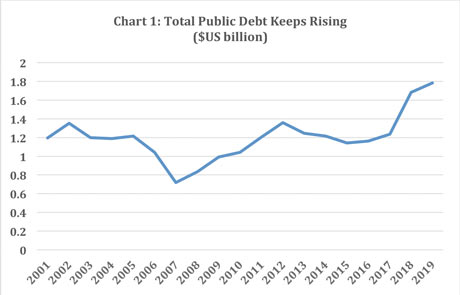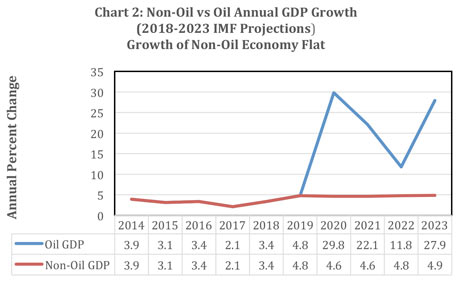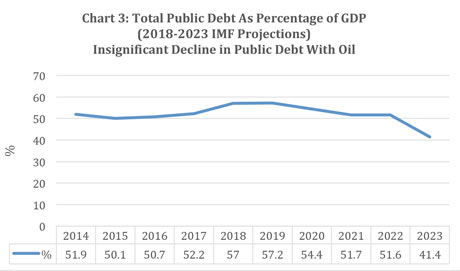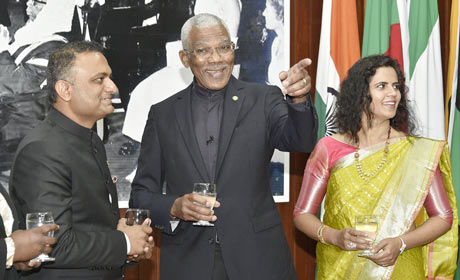Guyana Focus
Guyana’s economy

Guyana’s public debt keeps rising, in spite of debt relief and debt forgiveness. And though sustainable, the country faces moderate risk of debt distress. Even with expectations of substantial revenues from oil starting next year, total debt as a percentage of GDP is not expected to fall significantly over the next five years, contrary to the expectations of some that the country will be swimming in oil riches.
In his mid-year report, Minister of Finance, Winston Jordan stated that the country’s total public debt at June 30, 2019 was US$1.658 billion, a 1.5 percent increase over June 30, a year ago. Of the total debt, 76.9 percent, or US$1.274 billion represented external debt, while US$383.8 million or 23.1 percent was domestic debt. The external debt increased by three percent between mid-2018 and mid-2019, while the domestic debt correspondingly declined by 3 percent.
The Finance Minister’s report noted that the public debt is sustainable and faces a moderate risk of distress, primarily attributed to the “government’s commitment to meeting its financing needs and payment obligations at the lowest possible cost, over the medium-to-long term within prudent risk parameters.”



The report stated that had it not been for the relief provided by the Kuwaiti government, the growth of the public debt from the previous half year would have been 4.5%, and not 1.5%.
In the first half of 2019, the report states that public debt service payments increased by 17.3 percent, from US$44.3M in the first half of 2018, to US$52M. This was attributed to 96.9 percent increase in domestic debt service payments.
In total, debt service payments accounted for 9.4 percent of total government revenues in the first half of 2019, compared to 8.5 percent in the first half of 2018. External debt service payments accounted for 81.2 percent of total public debt payments, a 7.7 percent decline over the same period in 2018.
In the meantime, the Finance Minister noted that debt arrears have been accumulating at high interest rates and the government is actively engaging other bilateral non-Paris Club creditors in debt settlement negotiations.
In its last budget, the government projected total public debt to rise to US$1.783 billion by the end of 2019, a 5.9% increase over the previous year.
Incidentally, by the end of this year, total public debt would have increased by 56 per cent over the five-year period, 2015-2019, from US$1.143 billion to $1.783 – to reach its highest level since 1995, when the country was in the midst of a debt crisis.
Incidentally, when the former PPP/C administration took office in 1992, Guyana’s total external debt stood at close to US$2 billion or almost 600% of GDP. It reached a peak of US$2.1 billion in 1995 before falling to a low of US$720 million in 2007, following write-offs of more than US$1.1 billion by multilateral and bilateral creditors between the late 1990s and mid-2000s.
Debt write-offs were provided under the Multilateral Debt Relief Fund, the World Bank, and the IDB amounting to US$611 million in the 2006–07 period. Paris Club bilateral creditors and some non-Paris Club creditors also granted debt relief as part of the 2004 Paris Club agreement. In addition, part of the debt owed to Venezuela under the Petro Caribe agreement was written off against Guyana’s rice exports to that country.
Optimism about Guyana’s debt sustainability in the current environment is primarily based on the country’s new-found wealth in oil. According to IMF forecasts, Guyana’s economy would grow by a whopping 29.8 percent next year, and by an average of more than 20 percent over the following three years.
While growth in the country’s non-oil economy will remain relatively flat, averaging almost 4.8 percent per annum over the next four years, oil revenues will provide it with the ability to sustain its debt.
However, total public debt, as a percentage of GDP will remain above 50% until 2023, when it will fall to 41.4%. The current debt-to-GDP ratio is 57.2%, up from 50.1% in 2015, when the current government assumed office.
The debt-to-GDP ratio had declined from 67 percent in 2009 to 48.6 percent in 2015. Over the same period, external debt had declined from 46 percent of GDP to 36 percent, and domestic debt declined from 21 percent of GDP to 12 percent – based on IMF analysis.
Incidentally, as Guyana becomes richer, the country would no longer be eligible for concessional financing and would have to finance its debts at market rates. This would necessitate more prudent debt management, in spite of its oil riches. The failure of neighboring oil-rich countries, Trinidad & Tobago and Venezuela, should serve as a useful reminder of the necessity for sound debt management strategies.

According to a Ministry of the Presidency release, in his remarks, President Granger said Guyana and India are bound together by ties of blood, history and common interests since immigrants from India came to Guyana 181 years ago.
He also noted that India was among the first countries to establish diplomatic relations with Guyana after it became independent on May 26, 1966.
“Our relations are founded on mutual respect for each other’s territorial integrity and sovereignty, mutual non-interference in each other’s internal affairs, cooperation for mutual benefit, respect for treaties and international law and the maintenance of regional peace and security. Guyana and India have enjoyed excellent relations over the past 53 years. Our relations have been characterized by cooperation and collaboration in the fields of agriculture, culture, diplomacy, public health, public information, housing, information communication technology, infrastructural development, investment, renewable energy, sport, trade, training and water,” he said.
Granger noted that the relations between the two countries continue to be enhanced by high-level engagements. He noted that Guyana has signed and ratified the Framework Agreement of the International Solar Alliance in January 2018 under his tenure.
“I reaffirmed our commitment to the ‘Alliance’ during my attendance at the First Summit of the International Solar Alliance held in New Delhi in March 2018. Guyana looks to continue its cooperation with India in pursuit of its goal of becoming a solar state – a key component of Guyana’s Green State Development Strategy. Guyana looks forward to intensifying its cooperation with India during your tenure as High Commissioner,” President Granger said.
The release said that Ambassador Srinivasa, in his remarks, said although India and Guyana are separated by long distance, they have common characteristics and can continue to collaborate in various areas.
“Immense opportunity exists for the two countries to enhance bilateral trade, particularly in agriculture and food processing, oil and gas, renewable sources of energy, forestry, drugs and pharmaceuticals, education, health and infrastructure. India is committed to Guyana’s overall development and India’s participation in various sectors of Guyana’s economy will continue. The GSDS (Green State Development Strategy) has been recognised all over the world and India would like to benefit from Guyana’s experience in this field. Our two countries can indeed play a role in the international fora,” he said.
Srinivasa replaces former High Commissioner, Venkatachalam Mahalingam, whose tour of duty ended on July 1, 2019.

Bhopaul, who has previously told the media that he intends to study Quantum Physics as he is fascinated by the idea of explaining particulate matter movements as waves, has been a consistent top performer.
In 2012 he, along with Ramesh Ghir, secured 563 marks and shared the top spot at the National Grade Six Examination. In 2017 Bhopaul repeated this performance when he sat and passed 25 subjects at the Caribbean Secondary Education Certificate (CSEC) examinations.
At those examinations he was able to secure a total of 24 Grade I passes, representing Grade I passes in 23 subjects, including a double award for Agricultural Science, as well as a Grade II pass. The Council named him top regional performer that year after he took home seven of the nine regional awards presented for performances at CSEC.
This year 880 candidates from 10 secondary schools and five Private Centres wrote the examination in Guyana and according to Minister of Education Nicolette Henry 93% were able to secure passes with Grades I to V.
Bhopaul now holds an Associate Degree in Natural Science as does his classmate Leonardo Gobin. Gobin secured 13 Grade I passes and two Grade II passes. He has earned a Grade I in Pure Mathematics Units 1 and 2, Applied Mathematics Units 1 and 2, Biology Units 1 and 2, Physics Units 1 and 2, Environmental Science Units 1 and 2, Communication Studies and Integrated Mathematics. He acquired Grade IIs in Caribbean Studies and Chemistry Unit 1.
Gobin credits his family, God and his Mathematics teachers for his success, noting that even with his hard work he could not have achieved this much without them. He now hopes to study medicine and become a cardiologist.
Gobin advises future candidates to stay focused and set goals noting that when he set out to write the exams he had to discipline himself to stick to studying.
registration not illegal
She was ruling in the challenge by Christopher Ram to the ongoing house-to-house registration exercise which she said was a measure that was available to GECOM.
As the Caribbean Court of Justice (CCJ) ruled on June 18, Justice George emphasised that it was not for her court to set a date for elections. This is the task of the various stakeholders.
Justice George’s ruling would undoubtedly influence the Guyana Elections Commission's (GECOM) decision, under new Chairman Claudette Singh, as to whether general elections should proceed with or without the controversial HtH.
GECOM's statutory meeting under its new Chairman which was to be held yesterday has been rescheduled to today (Wednesday) as members of the commission are still to be provided a copy of the Chief Justice’s ruling.
The commission last met on Thursday when it was decided that no discussion on the way forward could be had without the written ruling.
HtH will develop a new register but Justice George cautioned that the removal of names from the list would be unconstitutional unless said persons are deceased or otherwise disqualified under Article 159 (2) (3) or (4).
Commenting on the court's ruling, the opposition People’s Progressive Party (PPP) said it is satisfied with position enunciated by Chief Justice (ag) Roxane George-Wiltshire and said it shows that the current house-to-house registration exercise is a waste of time as names cannot be deleted without cause from the National Register of Registrants (NRR).
“The Chief Justice ruled that house-to-house [registration] itself is not unconstitutional but she said that GECOM [Guyana Elections Commission] cannot operate as if it is in a normal election cycle. She said that residency is not a qualifying requirement and therefore those names of persons on the list, the NRR and the OLE [Official List of Electors], cannot be removed unless deceased or becomes disqualified based on Article 159 of the Constitution,” Opposition Leader Bharrat Jagdeo told a news conference following the ruling.
“The entire house-to-house [registration] done so far has been an entire waste of money because you cannot remove people from the NRR who have already registered. That means that the NRR that we have used to extract the OLE for all the elections before, that remains intact. Once your name is on the NRR and you voted in the last elections, they cannot remove your name. We are vindicated in telling people not to register. Your names cannot be removed whether you register or not. Not even GECOM can remove your name from that database. That is what we had been fighting for,” he added.
In his fixed date application, Ram’s attorneys had asked the court to declare that the registration exercise is in violation of the letter and spirit of the Constitution and the judgment and consequential orders made by the CCJ in the consolidated cases stemming from the passage of a no-confidence motion against government last December.
The application argued that since passage of the motion against the David Granger-led administration, neither the Cabinet nor President has resigned; nor has the Head of State issued a proclamation dissolving the National Assembly or fixed a date for elections to be held within the three months as is stipulated by Article 106 of the Constitution.
Tullow last week announced the discovery of oil in commercial quantities in its Orinduik Block, offshore Guyana, which represents the first commercial find outside of the Stabroek Block, where ExxonMobil has made 13 major finds since May 2015. Its first exploration well, Jethro-1, is estimated to hold more than 100 million recoverable barrels of oil.
Speaking with reporters after a press conference about a city chamber trade mission to Aberdeen, Quinn on Monday said that from his perspective, the Tullow find is good for Guyana for two reasons – it demonstrates that there is oil outside of the Stabroek Block, which shows that Guyana’s potential is far bigger than that block; and it brings in a whole new set of companies, countries and operators. “…And the more operators and countries and companies you have involved in the oilfields, the better,” Quinn said.
The find has also been attended by sharper scrutiny of the Production Sharing Agreement (PSA) signed between government and Tullow and Eco (Atlantic) in 2016. Under the agreement, Guyana will receive a 1 per cent royalty while profits will be shared on a sliding scale. Article 11 of the 69-page agreement, which addresses cost recovery and production sharing, says that the government will receive 50 per cent of profits earned from the first 25,000 barrels of oil per day, 52.5 per cent from the next 25,000 barrels, 55 per cent from the next 15,000 barrels, 57.5 per cent from the next 15,000 barrels and 60 per cent for production above 80,000 barrels.
Quinn refused to comment on the contract and said that is for Tullow and the government to discuss but he stressed that the find by Tullow is, fundamentally, good for Guyana.
Meanwhile, also speaking in wake of the find, President of the Georgetown Chamber of Commerce and Industry Nicholas Deygoo-Boyer emphasised the need to set up regulatory bodies for the oil industry.
Minister of Finance Winston Jordan last week noted that letters were sent to the varying stakeholders to submit their nominees for the Public Accountability and Oversight Committee that is to ensure the transparent spending of the funds.
He said no responses were received, including from the Private Sector Commission.
However, Deygoo-Boyer explained that a response was delayed during a changeover of the executive body and the private sector would be responding to Jordan.
Deygoo-Boyer also stressed that there is a need to set up the Petroleum Commission and other mechanisms to insulate the industry from too much political control.
“If you notice with the Exxon contract and the Tullow contract you have varying terms, so we need to move management of our oil industry from direct control by political actors, insulate it and make it transparent. And when it’s transparent I think you’ll see more of a harmonisation,” he said.
He added that when the Petroleum Commission is activated, the needed expertise can always be contracted on an as-needed basis.
“So you have lawyers and investment bankers and energy consultants who can give you reviews, who can do studies across the world to see what terms are in other PSAs across the world and highlight the risks and rewards to us for putting certain terms in and taking certain terms out and where we fall within a world of comparisons and then transparency would allow everybody to make their own judgment,” Boyer explained.
Tullow operates the Orinduik block with a 60 per cent stake, while France’s Total SA and Toronto-listed Eco Atlantic Oil & Gas Ltd each own 15 per cent, with state-owned Qatar Petroleum holding the remaining 10 per cent.
Eco had sold 25 per cent of its initial 40 per cent stake to Total last year and Reuters reported that the French oil giant in turn sold 40 per cent of its stake to Qatar Petroleum last month.
To advertise in ICW call
Call 905-738-5005